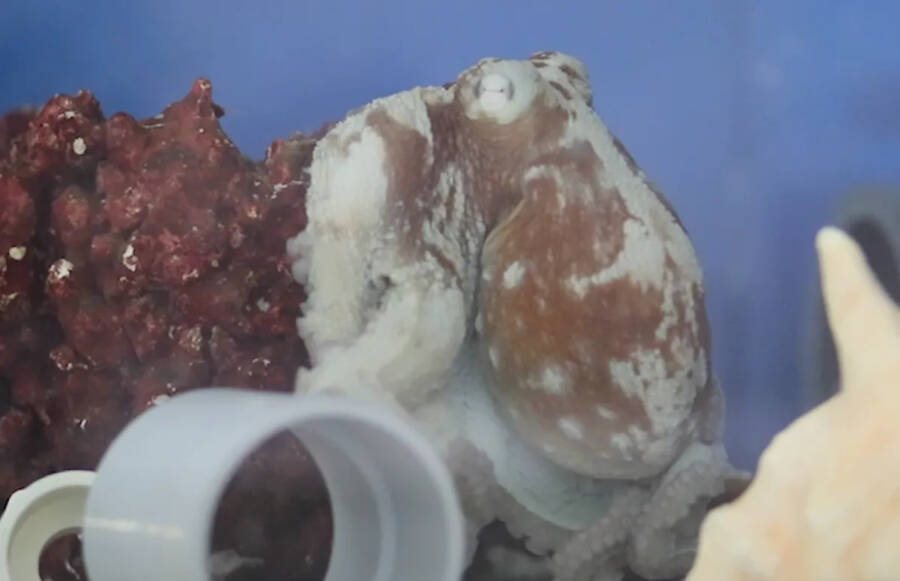At a lab in New York City, a male octopus named Costello suddenly woke up from his sleep and began flailing his arms and releasing ink. Researchers believe this behavior is evidence that octopuses experience nightmares.

Eric Ramos et al/Rockefeller UniversityThe octopus was sleeping in his tank when cameras captured his alleged nightmare.
Researchers at a lab in New York believe they may have captured footage of an octopus experiencing a nightmare. If true, this would suggest that octopuses, like humans, are capable of having complex, vivid narrative dreams.
The footage, captured with 24-hour cameras at The Rockefeller University in New York City, shows a male Brazilian reef octopus named Costello dozing off in his tank. Costello can be seen changing his skin colors while sleeping, a behavior that researchers believe may demonstrate dreaming. Like a dog who twitches in its sleep, it’s possible that an octopus may move and change its colors to reflect the nature of its dreams.
And Costello’s behavior offers possible evidence that the dreams weren’t all positive.
While reviewing the footage, researchers observed multiple instances in which Costello suddenly jolts awake from his sleep, flailing his arms in apparent distress. In two recorded instances, he even releases ink, a common tactic to defend against predators.
“It was really bizarre, because it looked like he was in pain; it looked like he might have been suffering, for a moment,” Eric Ramos, a researcher at the University of Vermont who helped film the octopus, told Live Science. “And then he just got up like nothing had happened, and he resumed his day as normal.”
This unusual behavior led researchers to speculate that Costello may have experienced a nightmare.
“The behavioral sequences displayed by this octopus upon emerging from disturbed sleep were similar to behavioral responses to nightmares, night terrors, and other parasomnias in humans, with a narrative structure resembling waking defense behaviors in octopuses,” the researchers wrote about the behavior in their study, which has yet to be peer reviewed.
“We speculate that the complex behavioral sequences displayed in these episodes suggest octopuses experience parasomnias which may include nightmares with the potential to disrupt their sleep,” researchers concluded.
Octopuses are certainly capable of intelligent activity, as they are equipped with highly developed brains.
Although humans’ last common ancestor with them was a flatworm that lived approximately 750 million years ago, researchers note that if this study’s finding is true, it appears we’ve both separately developed the ability to dream, indicating dreaming may serve some essential purpose for intelligent life.
“The potential occurrence of this phenomenon in octopuses would shed an unexpected light on the evolution of sleep in distantly related organisms with complex neural architectures,” the study concluded.
But although the notion that octopuses may experience complex dreams like humans do is an exciting one, it is not the only explanation for why Costello may have exhibited this behavior.
In a statement to Live Science, Robyn Crook, a neurobiologist at San Francisco State University, said that there is not enough evidence to prove that octopuses and other cephalopods dream at all. And even if they did, it’s hard to say whether they dream as humans do.
Crook believes that something may have startled Costello, causing him to display protective behaviors.
Another possibility Costello may have been going through senescence, a stage of an octopus’ life where its body starts to break down in preparation for death. For Crook, Costello’s movements in the video point more to nerve degradation and loss of motor control than to a nightmare. And indeed, Costello died away shortly after exhibiting these behaviors.
Even Ramos told Live Science that “I don’t exclude that senescence could be one of the drivers of this.” Some labs, he said, may euthanize octopuses before they begin to senesce, which could account for how unusual Costello’s behavior appeared to the researchers.
However, Ramos noted that most labs also do not monitor their octopuses for 24 hours a day, so they may have missed out on observing these behaviors.
For now, researchers can agree on one thing: more research on octopuses and other cephalopods is necessary.
“For all the studies that have been done” Ramons said, “there’s still so much we don’t know.”
After reading about the study into octopuses and nightmares, discover the coconut octopus, the cephalopod that uses tools and sometimes walks on two legs. Then, read about the dumbo octopus, the tough octopus with dumbo-like ears who swallows its prey whole.





